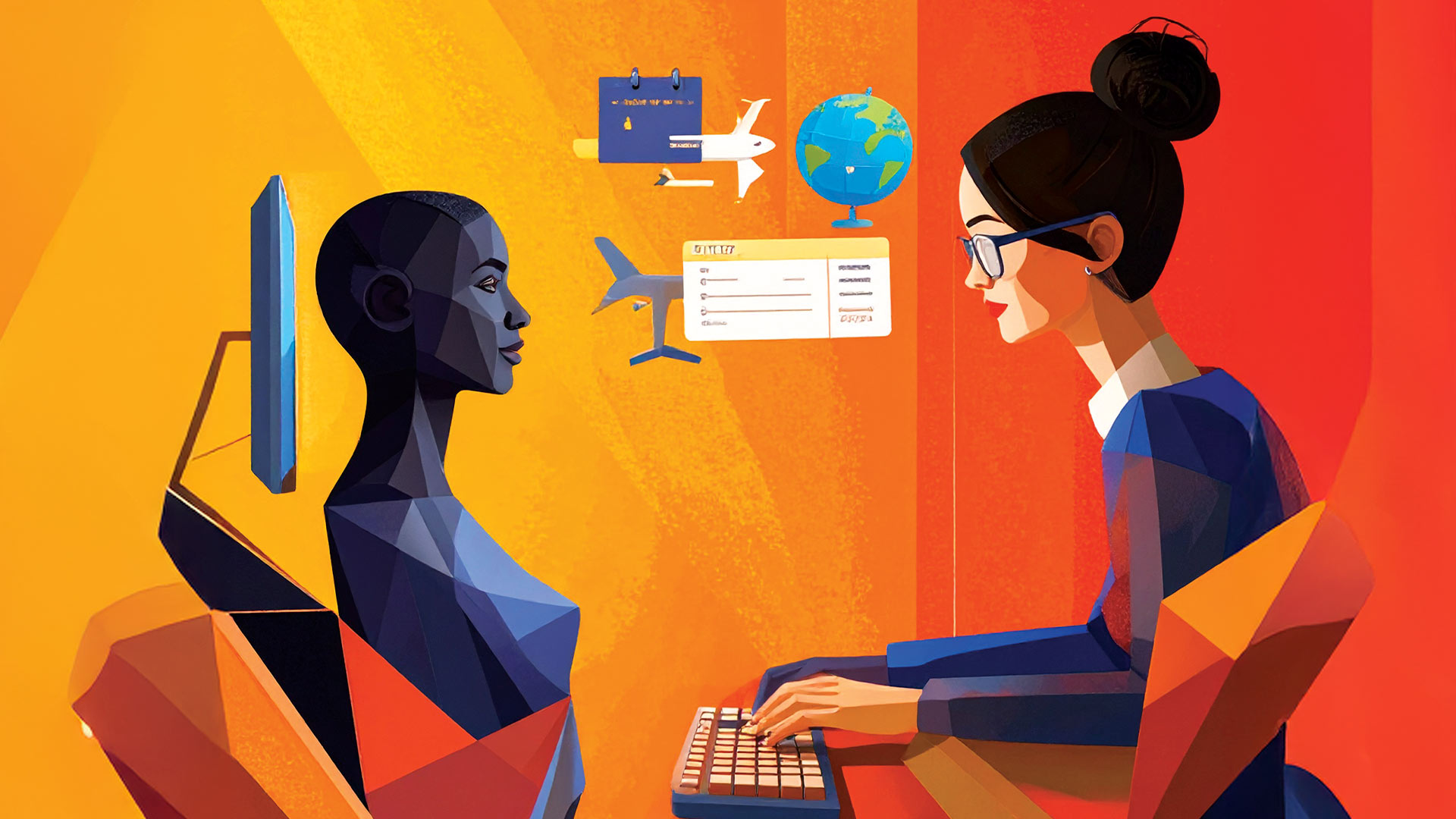Is AI Set to Transform Travel Planning?
India seems ready to adopt AI but is not yet ready to fully trust it, reveals a recent Bookiong.com report. The worldwide survey demonstrates that while AI is permeating daily life, caution, excitement, and curiosity are in conflict.
By Suman Tarafdar
To trust or not to trust—that seems to be the crucial question. In a short span, people worldwide have begun using Artificial Intelligence (AI) more frequently, especially Generative AI, which has given humans unprecedented freedom in integrating it into their daily lives. Still in its nascent stage, AI will improve over time, but concerns around reliability and, more significantly, trustworthiness remain.
To understand how AI is reshaping the way people live, work, and travel, Booking.com commissioned the Global AI Sentiment Report to explore how consumers use, trust, and respond to AI in everyday life and travel. Surveying over 37,000 people across 33 markets, including more than 13,000 respondents from the Asia-Pacific (APAC) region, the findings reveal how deeply AI is embedded in daily routines.
Asia, an early adopter of technology, unsurprisingly ranks among the highest in AI usage, with 82% reporting regular use. Search engines lead with 98% adoption across APAC, followed by AI-powered chatbots and streaming recommendations (87%). Voice assistants (82%), creative tools (81%), and smart devices (80%) are also widely used.
“It’s really the first time that we’re thinking about AI more broadly,” says Laura Houldsworth, Managing Director of the Asia Pacific region. “There’s not a day that goes by when it isn’t mentioned. What is the sentiment around AI? How are people feeling about it? What are they using it for? How much do they trust it? We really wanted to get that conversation started, and this report is just the beginning.”
Trust issues
Conversely, trust in AI tools is not as high as their usage. In APAC, search engines are the most trusted (71%), followed by smart devices (65%), streaming services (63%), generative AI (62%), and creative tools (62%), while chatbots (51%) and voice assistants (61%) rank lowest despite heavy use.
Trust in AI-generated information is even lower, with only 38% of APAC users fully or mostly trusting it. Key concerns include privacy and corporate use of personal data (54%), job displacement (44%), and ethical issues such as bias, misuse, or environmental impact (39%).
Globally, trust levels are lower, particularly in Europe and North America. Both regions approach AI with greater caution and scepticism, with consumers more inclined to fact-check outputs—underscoring a broader demand for transparency and reassurance as adoption expands.

Laura Houldsworth, Managing Director, Asia Pacific region, Booking.com.
India’s love for AI
India’s technology prowess has seen widespread adoption of technology, including Generative AI. The report reveals that 99% of Indian respondents say they are excited about AI, and 96% are familiar with the technology. Conversely, though, despite widespread enthusiasm, only 16% fully trust AI and almost everyone (92%) have at least one concern about its implications.
Just about a third (36%) Indian consumers are comfortable with AI making decisions independently, indicating hesitancy in fully handing over control to automation. 38% find AI impersonal and double-check AI outputs even when they trust the technology; 32% always fact-check; and 42% do so sometimes.
While there is enthusiasm and curiosity regarding AI, and almost half (46%) of Indian respondents identify as AI Enthusiasts, intrigued by AI’s potential. Another 28% are AI Advocates, actively championing its benefits and responsible adoption, their enthusiasm grounded in the belief that AI will make life easier (87%), save time and effort (65%), expand learning opportunities (64%), and enhance productivity (54%).
Not everyone agrees. The excitement also comes with significant caution. Five percent of Indian consumers classify themselves as AI Cautious, wary of AI’s development or use, and 4% as AI Sceptics. Notably, 10% identify as AI Detractors, signalling a meaningful segment resistant to AI adoption.

Santosh Kumar, Regional Manager - South Asia, Booking.com.
Generative AI represents one of the most significant technological shifts of our era, fundamentally reshaping how consumers engage with the world around them. In India, people are not just curious about Generative AI but are actively using it as a trusted co-pilot, shaping travel decisions and enabling memorable experiences.
Santosh Kumar
Regional Manager - South Asia, Booking.com

Will AI plan our travel?
The outlook is more optimistic when it comes to travel planning. Indians are enthusiastic about using AI for future trips, with AI Assistants (45%) now seen as more trusted sources than travel bloggers (36%) or social media influencers (31%), the report notes. Yet only 12% feel comfortable letting AI make decisions independently, while 25% remain unsure and 10% are very uncomfortable, refusing to trust AI without human approval.
“Generative AI represents one of the most significant technological shifts of our era, fundamentally reshaping how consumers engage with the world around them,” says Santosh Kumar, Regional Manager, South Asia at Booking.com. “In India, people are not just curious about Generative AI but are actively using it as a trusted co-pilot, shaping travel decisions and enabling memorable experiences. The opportunity ahead is tremendous. At Booking.com, we have long been at the forefront of AI innovation, integrating advanced machine learning to enhance the customer journey at every touch point. But as we enter this next phase, our responsibility goes beyond technology. Building trust, ensuring transparency, and prioritising safety are critical as we guide travellers—and our industry—into the future.”
AI is rapidly becoming central to the Indian travel experience. A vast majority (87%) has already used it for some aspect of travel, and nearly all (99%) have turned to AI for planning, booking, or while on a trip. Over two-thirds (69%) expect autonomous trip planning to become mainstream soon, reflecting growing reliance on AI-powered tools and openness to technology that enhances journeys.
Indian travellers are turning to AI to research destinations and the best time to visit (53%), discover local experiences or cultural activities (44%), and get restaurant recommendations (42%). AI assistants are now considered more trusted for planning (45%) than colleagues (23%) or influencers (31%).
During trips, consumers use AI for translation (55%), in-destination activity suggestions (52%), restaurant recommendations (49%), and navigating unfamiliar locations or transport (41%). After returning home, the most common AI use case is photo editing, cited by 51% of respondents.
AI’s role in daily life and travel is expanding rapidly, but the question of trust remains unresolved. Indians see AI as a co-pilot, a time-saver, and a tool to enrich experiences. Yet hesitancy persists, rooted in concerns around privacy, reliability, and the limits of automation. As adoption deepens, the challenge will be balancing innovation with transparency and safety. For travellers, trust will decide whether AI becomes a co-pilot—or just a cautionary tool.

Marnie Wilking, Chief Security Officer, Booking.com.
Just as attackers use AI, we use it to detect and block them. Our models now prevent malicious links and attachments from reaching travellers and partners. We are using AI in a lot of our detection and response pieces as well, making sure that malicious links and attachments can't get through to our travellers and our partners.
Marnie Wilking
Chief Security Officer, Booking.com

Webwide concerns
Talking about how privacy and security are ensured across its vast global platform, Marnie Wilking, Chief Security Officer at Booking.com, points out the need to invoke trust. “We adopt a multi-pronged approach: prevention, detection and response, and education. First, we focus on prevention—how do we stop attackers from getting onto our platform? How do we prevent fraud? Of course, we know we can’t stop everything, so the next step is detection and response. If something does get through, how do we detect it quickly, remove it, and make sure people understand what’s happening? Finally, education is critical. Both on the front end and back end, we publish articles on our partner hub and place banners on our site to say, ‘Watch out for scams’.”
AI, she notes, cuts both ways. “Attackers are definitely using AI. After OpenAI was released to the public in November 2022, we saw a sharp increase in phishing—anywhere from 300% to 900%, depending on the research. AI makes it easier for attackers to send large volumes of convincing emails, free of grammar errors, in multiple languages, and send at scale.”
But AI is also central to defence. “Just as attackers use AI, we use it to detect and block them. Our models now prevent malicious links and attachments from reaching travellers and partners. We are using AI in a lot of our detection and response pieces as well, making sure that malicious links can't get through, malicious attachments can't get through to our travellers and our partners, and we are using it in the prevention pieces as well. Over the past year, we’ve also improved our ability to identify fake properties, blocking more than 99% before they even get posted.”
Even so, Wilking stresses the need for human oversight. “Obviously, some of it gets through. We still have to have the human element since not everything can be caught by AI models, so humans are constantly reviewing, refining, and improving them.”
As head of security, she is very excited about AI. “There’s a tremendous opportunity here, and we take trust, safety, and security very seriously. I’m excited that AI is helping us strengthen those areas.”
Travellers themselves are often the targets, Wilking warns. “In the post-COVID travel surge, attackers realised the money to be made. They exploit the hospitality industry’s helpful nature, tricking hotel clerks into clicking or opening suspicious items because they think they’re assisting a guest.”
They also exploit the emotional nature of travel. “People spend months, even years, saving for trips to give their families a great experience. Attackers prey on that by threatening cancellations—‘Click this link and provide your credit card details or your booking will be cancelled.’ In normal circumstances, people might dismiss such messages as fake. But in the heat of planning a long-awaited trip— ‘Oh my God, I cannot, you know, take my kids to Disney’ or ‘I must take my family to see my grandmother’—they react emotionally and click. That emotional leverage is what makes attacks in the travel industry accelerate and hit harder.”

AI is fast emerging as the backbone of the Indian travel experience.


























